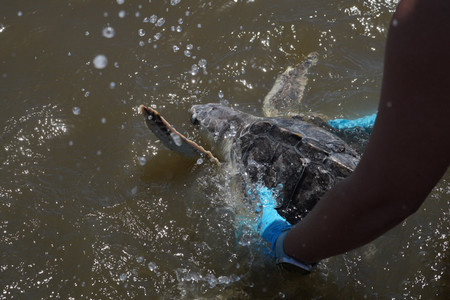
This summer, students from Howard College of Arts and Sciences immersed themselves in marine science courses and research at the Dauphin Island Sea Lab (DISL), a coastal research and education facility where Samford offers coursework as part of its Marine Science program.
For biology and environmental science majors, DISL offers a rare opportunity to apply classroom knowledge to the field. Through courses in shark and ray biology, marine botany, coastal birds of Alabama and sea turtle conservation, students gained firsthand experience studying aquatic ecosystems and the organisms that inhabit them.
Emma Hamilton described her sea turtle biology class as one of the most meaningful academic experiences she has had. “I got the opportunity to personally release a Kemp’s Ridley juvenile into the ocean, participate in the terrapin head start program and see a leatherback sea turtle nesting on Juno Beach,” she said. “It was unforgettable.”
Other courses were just as dynamic. Students spent multiple days each week aboard the R/V Alabama Discovery, collecting specimens, analyzing data and observing wildlife. “All of these experiences have helped me understand how I can use the skills I’ve gained in the classroom and transfer them to my future career,” Hamilton said.
Shiloh Nokes, a student from Wyoming, shared how her first coastal experience was both academic and personal. “Highlights included observing dolphins in their natural habitat, identifying plankton under the microscope and snorkeling in Florida to study aquatic plants,” Nokes said. “Growing up far from the ocean, the experience was truly transformative.”
Camryn Griggs reflected on the hands-on nature of the program. “We released turtles, leatherback hatchlings and diamondback terrapins, and even helped build drift fences to protect terrapin nests,” she said. Her courses in marine botany and coastal birds included a snorkeling trip to Port St. Joe, Florida, and a visit to Gulfport, Mississippi, to learn how coastal birds are banded and tracked for research.
For Madison Dorsey, the highlight was serving as data recorder during fish trawling operations in her marine vertebrate zoology class. “I was consistently recording IDs, species counts, weights and measurements,” she said. “It was fast-paced and high-pressure, but I loved it.”
Seth Hillis said his time at the Sea Lab deepened both his understanding of biology and his appreciation for community. “I enjoyed the field aspect of my marine botany and bird classes, because I experienced firsthand what we were studying,” he said. “Following an instructor through the field and conducting experiments gave me terrific experience.”
Through immersive fieldwork, research opportunities and unforgettable wildlife encounters, Samford students at DISL gained not only technical skills but also a deeper appreciation for marine ecosystems, and a clearer vision for their future careers.
GIVE: Support impactful work at Howard College of Arts and Sciences.
